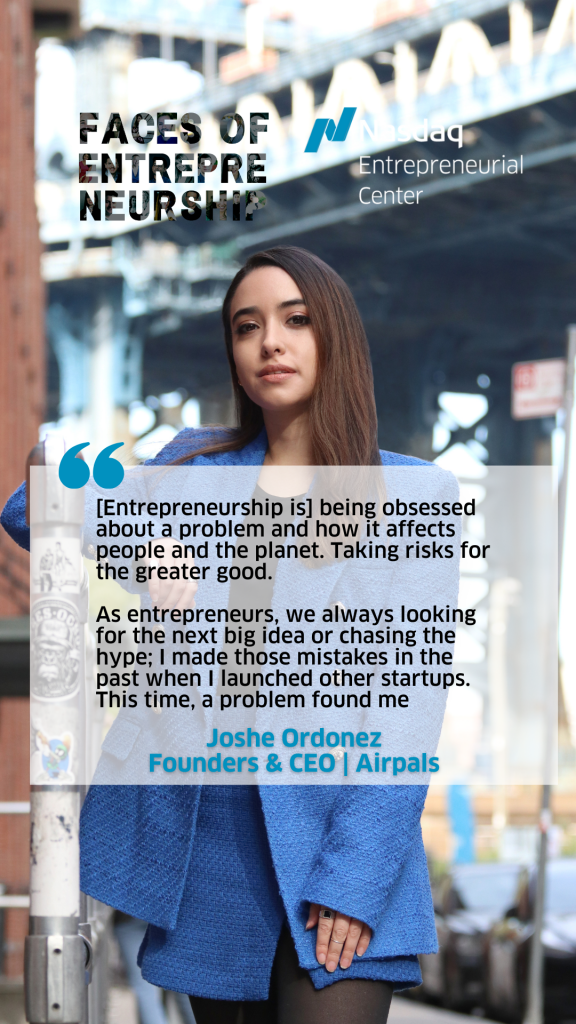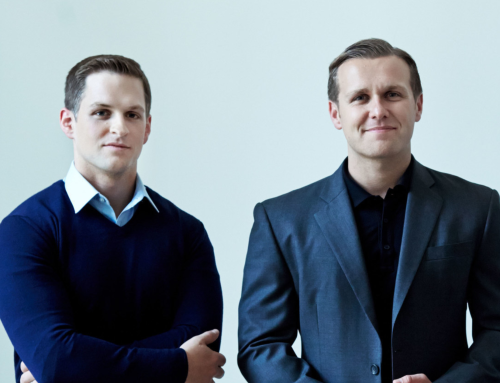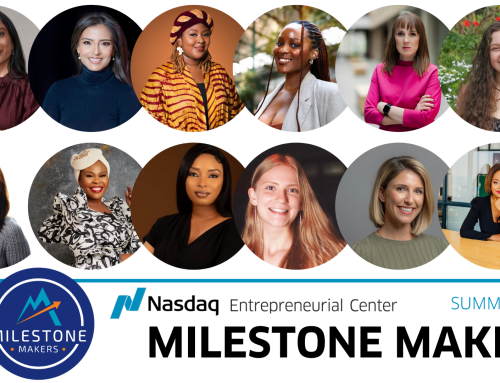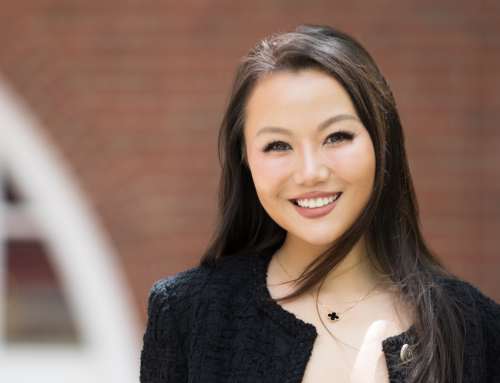Maria Jose Ordonez, also known as Joshe Ordonez, is an entrepreneur and multi-disciplinary strategist from Ecuador now based in Brooklyn. She is the Founder and CEO of Airpals, a B2B platform that helps teams to book and coordinate local courier or messenger services for in-house projects. Joshe founded Airpals after years of struggling with internal logistics at companies and projects she worked on within the fashion industry and other operational-heavy fields. She combines her cultural knowledge and design expertise to create products and services to create a positive impact on communities and cities.
What does “entrepreneurship” mean to you?
 Joshe Ordonez: Being obsessed about a problem and how it affects people and the planet. Taking risks for the greater good.
Joshe Ordonez: Being obsessed about a problem and how it affects people and the planet. Taking risks for the greater good.
Tell us about your first experience with entrepreneurship.
JO: Selling colored quartz rocks with my siblings when we were kids.
What is your company’s origin story? What is the biggest reason you started your business? What did those early days look like and teach you?
JO: I’ve been working in the fashion and other heavy operational industries for the past ten years. Throughout the years I gained exposure and experience across the board. Product development, textile engineering, sustainable design, supply chain, photo, and video production, I did it all. I realized that there was a common thread in all those experiences, and it was logistics. At some point, as a Fashion Producer, for me, it was easier to get a Gucci bag from New York to Nigeria overnight than get a project-related item from Brooklyn to Manhattan. I was frustrated with the legacy options in the market, using them caused friction in writing the parties involved and required a lot of time to get things done. I built Airpals, first as a solution for the projects and companies I was working with. Not long after that, I connected the dots, the market size, the untapped segment, and my insights. Airpals was born from a problem I was dealing with when coordinating a lot of (literally) moving pieces for commercial projects.
As entrepreneurs, we always looking for the next big idea or chasing the hype; I made those mistakes in the past when I launched other startups. This time, a problem found me.
What do you wish you knew when you started? Is there anything you would do differently?
JO: That starting a business is not hard, scaling it is. I am not a person who regrets things but If I could go back a few years, I would have loved to learn more about investing and put some money to work for some time before quitting my job to build Airpals. For context, I used all my savings during the pandemic, I wasn’t paying myself even after we raised our first round of funding.
What does “success” look like for you? We’d love to hear your biggest, boldest dream? What do you think will help you achieve it?
JO: I would love to see Airpals sustain high growth without sacrificing the well-being of the planet, the communities around us, and the financial stability of the company. I want Airpals to be a multi-billion company, and I want to get there with a highly diverse team.
What is your superpower as an entrepreneur? What is your proudest and darkest moment so far?
JO: I always find it hard to describe myself. I would say that my strategic creativity has gotten me to where I am today. But not without kindness, awareness, and the drive to do good for others. High: When I submitted the last payment for my master’s program a few days before graduation after working three jobs for two years and telling my family that we raised funding for Airpals. Low: Leaving my homeland, family, friends, and everything I knew to build something big. The first night in the states sleeping on an air mattress with uncertainty about the future.
What are your personal driving principles, your top values?
JO:
- Instead of doing less harm, do good
- Leave this world in better shape than which I found it
- Never forget where you come from
- You can’t buy time back
- Nothing worthwhile is easy to achieve
- Not all that glitters is gold
- Don’t be so serious all the time, have fun
- Give first
How have your personal principles and values shaped your company’s values and principles? Give us some examples.
JO: Here is how each of my Personal Principles is reflected in Airpals’ culture
- Instead of doing less harm, do good: Paying delivery workers 3x more than in traditional marketplaces
- Leave this world in better shape than which I found it: Reduce environmental footprint as much as we can. From appropriate recycling at the office to building technology to streamline local logistics and reducing carbon emissions
- Never forget where you come from: There is no room for an entitlement mentality. We all started somewhere and everyone deserves to be treated with respect.
- You can’t buy time back: Move with a sense of urgency. Prioritize high-return tasks.
- Nothing worthwhile is easy to achieve: The road is bumpy. If potential team members want to get in only for the highs, they are not a good fit for the company.
- Not all that glitters is gold: Don’t take decisions based on hype. Don’t take investments only for the money, look for partners that share your values.
- Don’t be so serious all the time, have fun: Encouraging team members to take breaks and pursue passions outside work
- Give first: Don’t be super transactional, help others if you can without asking for something in exchange. (Investor or customers intros etc)
What’s it like to work alone or with your partners?
JO: I am a solo founder but I don’t feel alone, my team is extremely supportive. If things go south, of course, I have all the responsibility. Sometimes, I wish I can duplicate myself but it is what it is. I like to remind myself that, I am not the first or last solo female founder in the industry. If other women could achieved success on their own, so can I. In all seriousness, how hard will it get? (With a humorous tone) I am a woman of color, with no credentials, no exits under my belt, solo and non-technical founder. For me is about learning as much as I can, having a community I can lean on, and not being afraid of making big bold moves.
Have you raised outside capital so far?
JO: Yes, angel and pre-seed rounds. We’ve raised from venture capital funds and have received an award from Google’s Latino Founders Fund. I decided to go through this route because of the huge potential of the tools we are building and the impact we can create with them.
How long have you been in that process?
JO: The angel round took four months; it was my first time fundraising and I made a lot of mistakes like not focusing on connecting with investors with a thesis that aligns with our company. I also made the mistake of always asking for money first, instead of building a relationship based on trust.
The second round was faster, we confirmed all the investors participating in the round within three weeks.
Where do you meet investors?
JO: Through a combination of everything, online networking, cold emailing, intros, and in person events.
How has your network helped you raise capital?
JO: A lot, every person you meet unlocks endless opportunities to learn and connect with other people excited to support you along the way.
Do you have a mentor? Tell us about what makes them valuable to you and your business?
JO: Yes, I look up and stay close to other founders that are some steps ahead of me. I believe that we are the average of the five people around us so I am always trying to surround myself with people I can learn from. I strongly value other people’s life and professional experiences either if we agree or not.
What role does mentorship play in your world (as a mentor or mentee)?
JO: Learning and teaching are two of the most important elements of life. If you are not doing both, what are you doing? (With a humorous tone again).
There is always room for improvement and there is always something you know that somebody else doesn’t. Give first!
I personally think that you can learn a lot by teaching others. Sometimes you have a concept in your mind that is not fully engraved on your brain until you preach it.
Many entrepreneurs continue to perfect their daily routines to support their work and greater vision; would you mind sharing your morning routine or a regular ritual that grounds your work each day?
JO: I don’t have a set routine, but I have some habits that I practice to keep me grounded and squeeze in every second of the day.
- Meal planning: To reduce plastic waste and cooking time and guesswork during the week.
- Intermittent fasting: To improve energy levels, stay healthy and sleep well.
- Reducing meat in my diet (I try as much as I can but would love to get better at this): To reduce environmental impact and improve my energy levels. You can’t aim to build an environmentally sustainable company if you don’t practice these values at a personal level. Otherwise, would be hypocrisy.
- Avoid scheduling calls in the morning: Creating blocks of time for calls and meetings allows me to have more time to focus on tasks that require greater attention.
- Don’t force yourself: Organize tasks by priority and mood. If I force myself to perform tasks that I am not in the mood to do it will take me longer to finish them.
- Always wear sunscreen: Your face is how you confront the world, take care of it.
- Breaking stereotypes: I like to be free in terms of fashion, I rarely wear suits or “business attire”. For me, clothes are my armor and I like to have fun with them. Sometimes is hard because people will judge you by how you look especially at events but I think things are getting better.
What are you reading or have read?
JO: The Right it by Alberto Savoia
Where do you go for inspiration?
JO: To the streets.
Do you have a favorite quote, mantra, or words of wisdom to get through the tough days?
JO: A bad day only lasts 24 hours, and if you sleep 8 hours would be 16 hours. Hold on there!
What is a problem that keeps you up at night?
JO: Scaling the company
How do you think about helping others through your work?
JO: If we don’t solve problems for our customers and lift professionals through a great, and collaborative company environment, I don’t see the point of working. Working solely for money is not fulfilling, money is a tool. There is nothing more fulfilling than helping others do what you love.
What advice do you have for fellow (and aspiring) entrepreneurs building and leading teams?
JO: Excessive mental health and emotional intelligence. Building and leading teams are really hard and you have to be mentally strong to lift everyone around you.
What kind of an entrepreneur do you want to be known as – as in, what do you want your legacy to be?
JO: In terms of legacy, I would like to leave a company capable to change lives through technological, social, and economic development and to leave a culture where folks act and build with ambition but selflessly.
Do you have someone you’d like to nominate to be profiled in our Faces of Entrepreneurship series? Please let us know by emailing media@thecenter.nasdaq.org or submit your nomination using this form.




Invite a Friend
Close